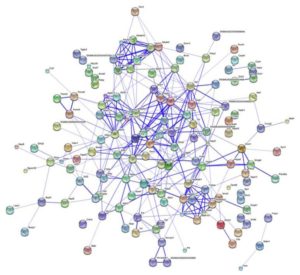A Greek study led by Adamantia Fragopoulou and Lukas Margaritis has demonstrated important protein changes in the brain of animals following whole body exposure to RF electromagnetic fields, similar to the kind of microwave radiation emitted from cell phones, portable phones, WiFi and wireless computer equipment. The study, “Brain proteome response following whole body exposure of mice to mobile phone or wireless DECT base radiation”, was published in Electromagnetic Biology and Medicine, Early Online: 1–25, 2012.
Important regions of the brain necessary for learning, memory and other functions of the mammalian brain were impacted by the microwave radiation, including the hippocampus, cerebellum and frontal lobe, at exposures below the ICNIRP (International Commission on Non-Ionizing Radiation Protection) safety guidelines. A total of 143 proteins in the brain were impacted by the RF radiation over a period of 8 months, providing new evidence for a potential relationship between everyday cell phone use, wireless transmitters and wireless computer equipment and electrosensitivity symptoms, such as headaches, dizziness and sleep disorders, as well as with tumors, Alzheimer’s and even metabolic effects.
The study simulated 3 hours of cell phone exposure over eight months, 8 hours of DECT portable phone exposure over eight months, and included a sham exposure control group. The results showed both down regulation and up regulation of the proteins.
Several neural function related proteins (i.e. Glial Fibrillary Acidic Protein (GFAP), Alpha-synuclein, Glia Maturation Factor beta (GMF), and apolipoprotein E (apoE)), heat shock proteins, and cytoskeletal proteins (i.e. neurofilaments and tropomodulin), were shown to be impacted by the radiation, as well as proteins of the brain metabolism (i.e. Aspartate aminotransferase, Glutamate dehydrogenase), in nearly all of the brain regions studied.


Figure 2 from the study shows the 143 proteins that have changed (up- or down-regulated) and their functional relationship based on a literature survey.
Adamantia F. Fragopoulou, M.Sc., PhD Candidate, in the Dept of Cell Biology and Biophysics at University of Athens, Greece, lead author of the study, says,
“Our study is important because it shows for the first time protein changes in the mouse brain after EMF exposure and in particular in very crucial regions like hippocampus, cerebellum and frontal lobe, all involved in learning, memory and other complicated functions of the mammalian brain. We have demonstrated that 143 proteins are altered after electromagnetic radiation, including proteins that have been correlated so far with Alzheimer’s, glioblastoma, stress and metabolism. In its perspective, this study is anticipated to throw light in the understanding of such health effects like headaches, dizziness, sleep disorders, memory disorders, brain tumors, all of them related, to the function of the altered brain proteins…
…Lukas H. Margaritis, PhD, Professor Emeritus (as of Sept 2010) of Cell Biology and Radiobiology, Dept of Cell Biology and Biophysics, University of Athens, head of the Athens research group, says,
“A high throughput approach (mass characterization of biomolecules, similar to microarrays that analyze the total genes of an organism) as that of the Proteomics* has never been used so far in EMF research of BRAIN TISSUES following whole body exposure of model animals (mice) at SAR values below ICNIRP’s recommendations. It is also the first time that wireless DECT phones base radiation is involved in lab animal studies and specifically in such molecular effects. The message taken out of this work is that people should be very cautious when using mobile phones next to their body (especially next to their brain), whereas the wireless DECT should be located as far away as possible from places that people use to spend many hours a day, not to mention children of all ages.”
READ MORE HERE:
http://electromagnetichealth.org/electromagnetic-health-blog/mice-proteome/

